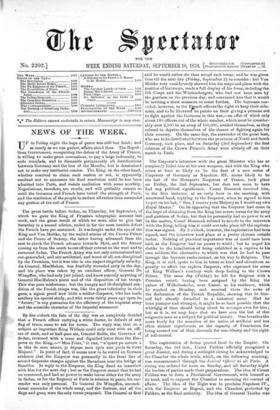The Emperor's interview with the great Minister who has so
completely foiled him at his own weapons, and with the King who seems at least as likely to be the first of a new series of Emperors of Germany as Napoleon III. seems likely to be the last of the Bonaparte Emperors of France, took place on Friday, the 2nd September, but does not seem to have had any political significance. Count Bismarck received him, in the first instance, at an early hour in the morning, with uncovered head, replying to the Emperor, when he signed to him to put on his hat, " Sire, I receive your Majesty as I would my own Royal Master." On its appearing that the Emperor had come in the hope of obtaining from the King less severe terms for the army and garrison of Sedan, but that he personally had no power to act in the matter, Count Bismarck refused to accede to the interview with the King, telling him it could not take place till the capitula- tion was signed. By 2 o'clock, however, the capitulation had been signed, and the interview took place at a pretty chateau outside Sedan. Nothing of practical importance was or could have been said, as the Emperor had no power to wield ; but he urged his dislike to the humiliation of being exhibited as a captive to his own soldiers, the alternative to which was that he had to pass through the German ranks instead, on his way to Belgium. The King, it is said, spoke to him in terms so kind and chivalrous as greatly to affect the captive Emperor, who expressed his sense of King William's courtesy with deep feeling to the Crown Prince. The same day (Friday) he left for Belgium with a Prussian escort, having been assigned by the King the palace of Wilhelmshohe, near Cassel, as his residence, which he reached on Monday, and received there the news of the declaration of the French Republic, showing that he him- self had already dwindled to a historical name. Had be been younger and stronger, it might be at least possible that the whirligig of time should bring about its revenges even for him ; but as it is, we may hope that we have seen the last of this enigmatic man as a subject for political history. One breathes the more freely for the cessation of his series of artificial and too often sinister experiments on the capacity of Frenchmen for being amused out of their demands for true liberty and the right of self-control.






























